Ultrasound the Hague – all Scans under one Roof at Midwifery Practice Margriet
Ultrasounds provide peace of mind, clarity, and beautiful milestones during your pregnancy. In our practice in The Hague, we perform medical ultrasounds with time and attention to your questions, so you know exactly what is being examined and what you can do with the results. We operate throughout The Hague, Rijswijk, and Westland. Because we have the ultrasound equipment in our practice, we can – if necessary – schedule quickly and perform additional checks, without detours. That feels just a bit more reassuring when it matters most.
Which Ultrasounds Can You get During Pregnancy?
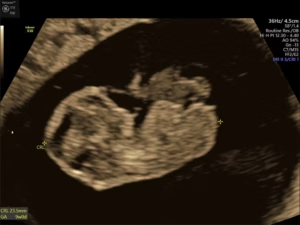
This Early scan, also known as a viability scan, shows signs of life. You can see the embryo developing. From 10 weeks, it is referred to as a fetus.
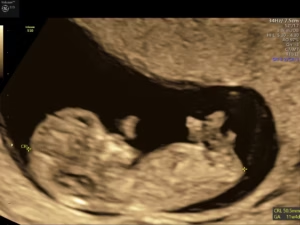
Then it’s time to accurately measure how many weeks pregnant you are. This is because we previously calculated from the last day of menstruation. You will also be informed of your due date.
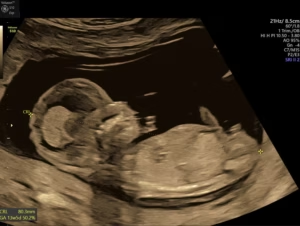
This optional 13-week scan screens for abnormalities. It further examines the structures of the organs and limbs that have developed so far.
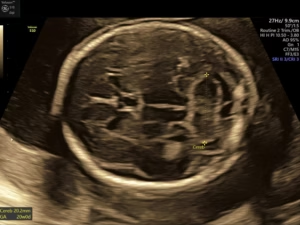
The 20-week scan (SEO scan) extensively screens for the development of organs and structures. Here is an example of the skull and brain.
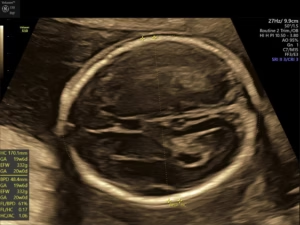
If there is an indication for additional monitoring, we perform a growth scan. This is because progression and development are more important than a snapshot. This includes measuring the skull.
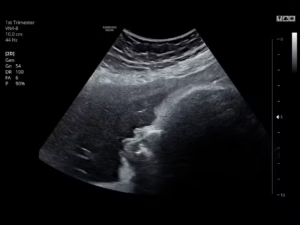
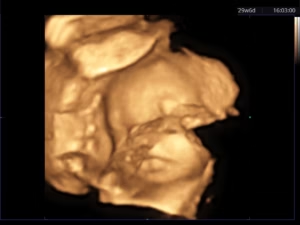
Keepsake scans come in various forms, from classic 2D ultrasounds to 3D ultrasounds. They are enjoyable to have and can be performed upon request.
Early Scan and Dating Scan
In the first few weeks, we check if the pregnancy is in the uterus, if the heart is beating, and how many babies you are expecting. This can usually be done from 6-7 weeks. Around 10–12 weeks, the dating scan follows: with this, we determine the gestational age as accurately as possible. These scans provide much reassurance during a period full of new feelings and questions.
13-Week Scan (ETSEO) – Medical Screening around 12+3 to 14+3
The 13-week scan is a medical examination for physical abnormalities in your child. You choose whether you want this scan. The examination takes place between 12+3 and 14+3 weeks of pregnancy and is similar in design to the 20-week scan. During counseling, we discuss what the scan can and cannot show, and what any next steps might be.
20-Week Scan (SEO/TSEO) – Extensive Structural Examination
The 20-week scan is also a medical screening. The sonographer extensively examines the development of organs and structures, and features such as the spine, skull, heart, and kidneys. The examination period is from 18+0 to 21+0 weeks; preferably, we schedule it between 19+0 and 20+0 weeks for optimal assessment. This scan is also a choice; we calmly discuss beforehand what the examination entails and what significance the results have.
Growth Scans and Presentation Scan
Sometimes, additional monitoring is medically useful, for example, if there are doubts about growth, presentation, or amniotic fluid volume. In such cases, we schedule a growth scan or a presentation scan. Together with you, we assess the necessity: useful scans yes, unnecessary scans no – always tailored to your situation and wishes.
Additional Scan upon Request – Keepsake Scan
Would you like an extra peek in between for your peace of mind? Because we have the ultrasound equipment in-house, we can usually offer an appointment quickly. Gender determination is one of the options. At the same time, we honestly emphasize what such an extra scan can and cannot do; it is not a replacement for the 13- or 20-week scan and does not guarantee that everything is excluded. The 20-week scan is not intended for gender determination; sometimes the gender is visible, but the primary goal remains medical examination.
ETSEO & SEO: Good to Know
The 13- and 20-week scans are not “ordinary” ultrasounds: they are medical screenings offered according to the national program. They require specialized sonographers, established procedures, certified equipment, and strict quality control. Only locations that meet these national quality requirements are permitted to perform these examinations. This ensures that the assessment remains reliable and follow-up care is well-organized immediately if something extra is needed. That is precisely why we refer you for these two examinations to our established, nearby ultrasound center in Rijswijk; we will schedule it for you, and we will discuss the results and follow-up together again in our practice.
How Does an Ultrasound Proceed with Us?
You enter a quiet room, we go through your questions, and explain in understandable language what we are going to do. During the ultrasound, we talk you through it: what you see on the screen in front of you, why we take certain measurements, and when we zoom in extra. Afterward, we discuss the findings, clearly and without jargon. If something stands out, we consult with you about next steps, such as an additional assessment in the hospital (e.g., a GUO) or a follow-up scan at a later time. The choice is always yours; we provide complete, honest information with sound advice.
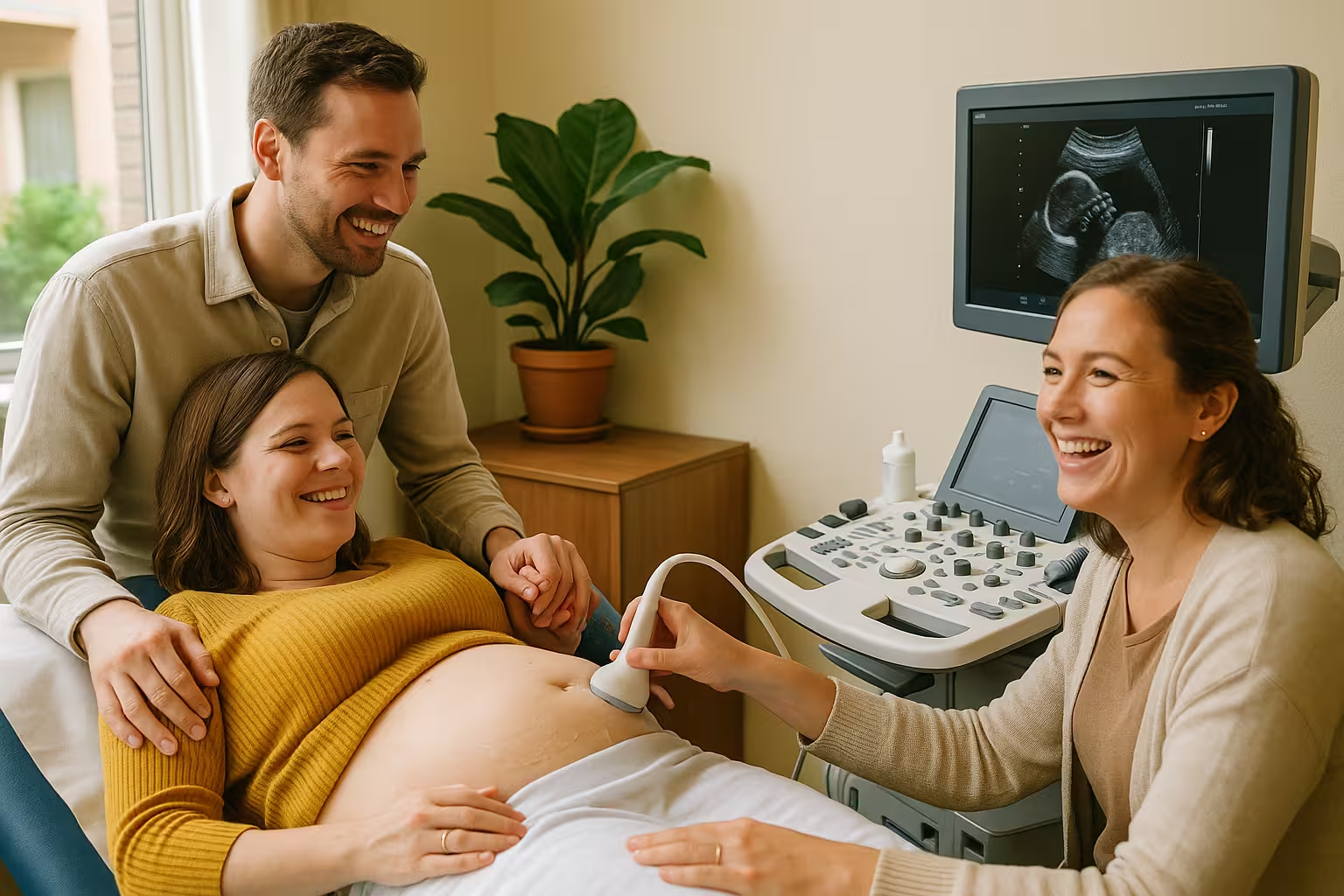
What Can You Expect and not Expect from the 13- and 20-Week Scan?
Both examinations are screenings: they detect a large portion of serious physical abnormalities, but not all. Sometimes an ultrasound shows something that later turns out to be harmless; sometimes an abnormality remains unnoticed, especially if it concerns very small or difficult-to-see structures. That is why good counseling is so important: we help you think beforehand about what you want to know and what you would do with a potential result.
Timing, Preparation, and Reimbursement
You schedule the 13-week scan between 12+3 (read: 12 weeks and 3 days) and 14+3 weeks; the 20-week scan between 18+0 and 21+0 weeks, preferably in week 19–20. You do not need to prepare specifically; preferably wear comfortable clothing and bring your questions so we can discuss them together. The 13- and 20-week scans are part of the national program for prenatal screening; you choose whether to participate. For additional examinations and reimbursements, we always advise you to check your policy.
Frequently Asked Questions
What is the Difference between an Early Scan, a Dating Scan, and a 13- or 20-Week Scan?
The early scan and dating scan provide clarity on presentation, heart activity, and gestational age. The 13- and 20-week scans are screenings that specifically examine your baby’s development. During an ultrasound in The Hague, we always explain the purpose of the examination and what you can do with the results.
Can My Partner or Child(Ren) Accompany Me to an Ultrasound in the Hague?
Yes, that is possible. We find that it is pleasant to experience this together. Please note that we work with concentration during medical ultrasounds; afterward, we take the time to explain the images and answer questions, so that your ultrasound in The Hague proceeds both warmly and carefully.
Do You Provide Photos or a Video During the Ultrasound?
Where possible, we are happy to provide a printout or a short video for personal use. The medical assessment always takes precedence; if we need to zoom in or measure extra, that comes first. At the end, we discuss what we can provide, whether digitally or not.
Can You Determine the Gender During an Ultrasound?
We can also perform gender determination from 16 weeks. During check-ups, we can note this for you upon request.
Is an Ultrasound in the Hague Painful and is it Safe?
An ultrasound is generally painless and uses sound waves, not radiation. Sometimes the pressure from the probe can be slightly sensitive to measure accurately, but we always take this into account. Safety and comfort go hand in hand with your ultrasound.

